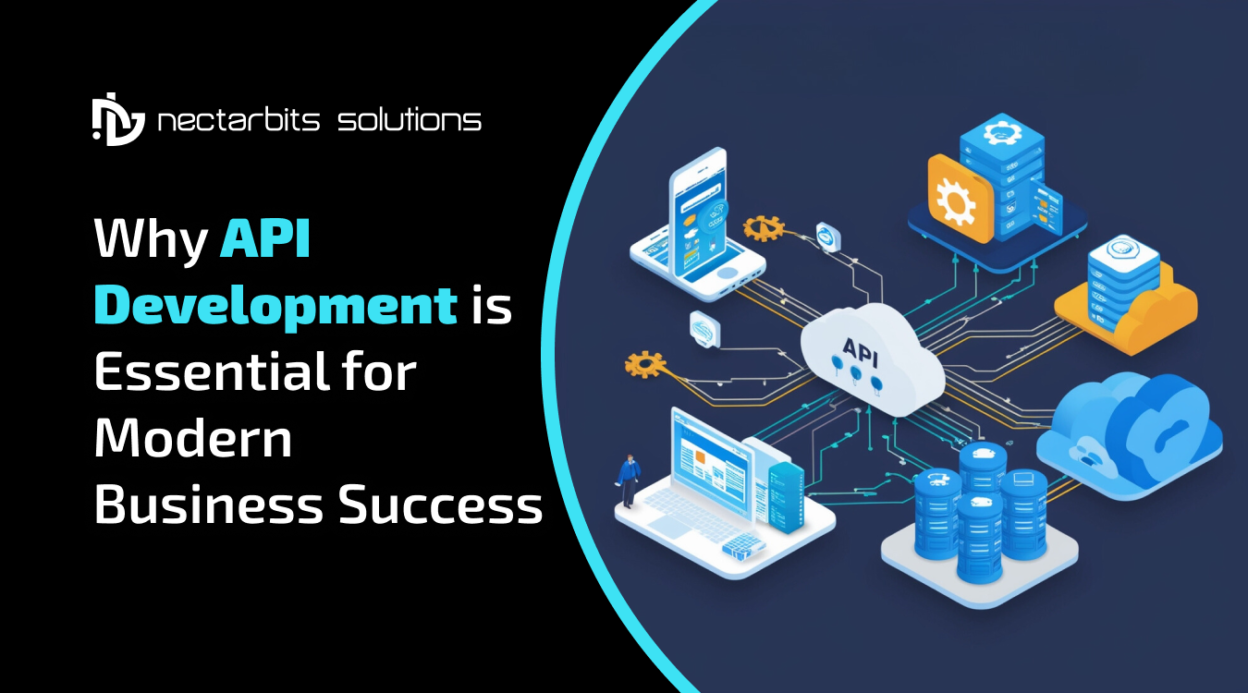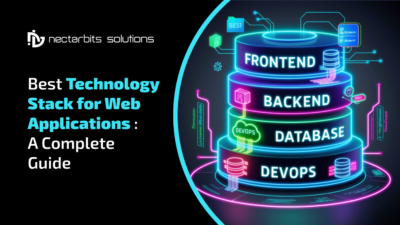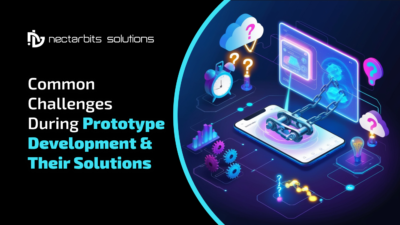In the digital age we live in today, modern businesses are required to always be interconnected and adaptable in order to scale and thrive in a sustainable manner. One of the primary catalysts for this process comes from the innovations done within API Development, an essential component for modern businesses today. APIs or “Application Programming Interfaces”, ensure that various software systems can communicate effectively with each other, providing better operational streamlining and further enhancing customer experiences.
This blog dives deeper into this $7.6 billion market growing at a CAGR of 17.1% and defines what is API development and its benefits for businesses. Alongside a step-by-step API Development Guide, the blog also talks about how to integrate APIs successfully with business operations. Lastly, the content below answers the age-old question of why investing in robust API Development Services is crucial today for any global business venture in search of reliable success.
What is API in Web Development?
Many emerging businesses wonder what is API in Web Development and its role in enhancing usability and accessibility for the masses. In short, APIs are the glue that holds the modern web together. APIs help different software systems communicate and share data among themselves in real-time. It is a messenger that looks for requests, translates them, and gives a response to the user. This lets the APIs be mixed into everything from websites, mobile apps, cloud-based systems, etc.
For example, if you have ever used a travel aggregator to book a flight or hotel room, it is their APIs that enable such websites to pull real-time availability and pricing data from multiple providers. API Development enables users to access this information from various sources, making it a key for providing a unified, real-time experience.
Importance & Benefits of API Development for Modern Businesses
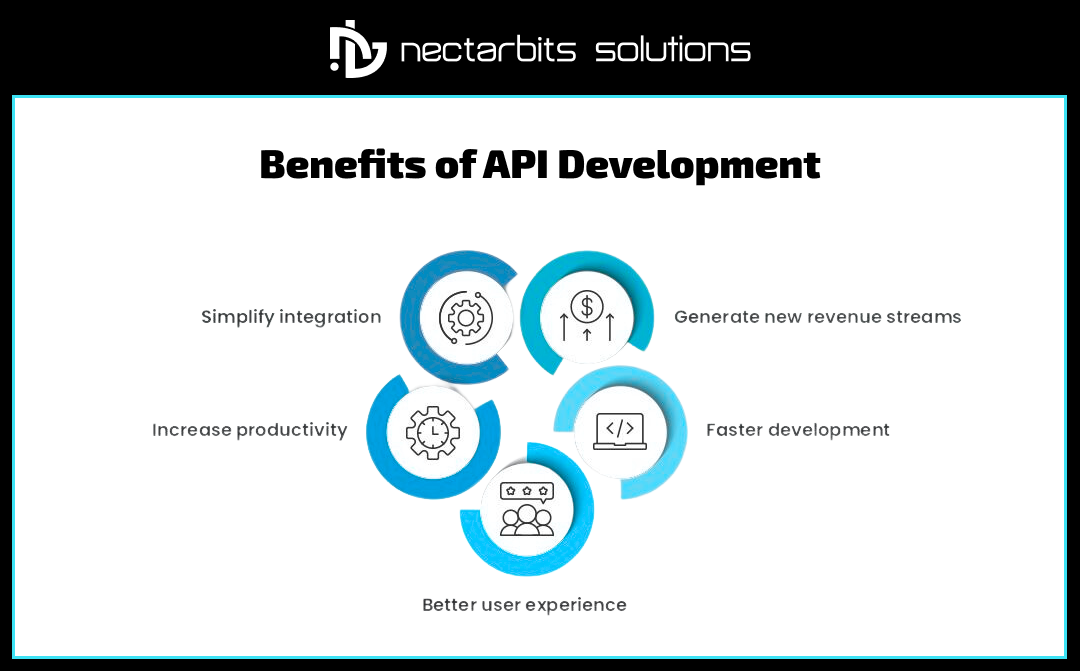
Once APIs become the backbone of a business, they’re no longer just a tool for developers, but the engine that drives the business forward for generations. Here’s why API Development is critical for modern enterprises:
1. Operational Efficiency
Manual data entry is eliminated by APIs since it eliminates human error. By using APIs, businesses can run more efficiently and automate exchanges of data between systems. For instance, APIs can introduce automatic synchronization of inventory data from your eCommerce platform to your accounting app to guarantee stock according to all channels.
2. Improved Customer Experiences
For any business in today’s competitive marketplace, customer experience is everything. Personalized experiences are offered by businesses through connecting various systems that have customer data, using APIs. For instance, if your business offers services to customers through various touch points, either through mobile app development or through a website, social media, etc.— APIs make sure that information about customers is consistent across all these touch points.
3. Scalability
One of the biggest benefits of API Development Services is scalability. While APIs can integrate new services, functionality, or third-party systems without having to rewrite your existing infrastructure, APIs scale as your business does. It makes it easier to introduce new features, and scale operations when you need them.
4. Fostering Innovation
APIs allow us to open up worlds of possibilities. With the proper use, third-party APIs can then be used by businesses to have cutting-edge features like Artificial Intelligence / Machine Learning or real-time analytics integrated into their system. Developing these capabilities from the ground up can require a lot of staff and time, and instead, businesses can use the capabilities of external APIs to stay ahead of the curve.
5. Monetization Opportunities
Monetization potential is also another reason why API Development is important for modern businesses. Smart businesses can even build their APIs and sell them on a pay-as-you-go basis. For instance, companies in areas like finance, healthcare, and logistics are providing premium APIs to developers allowing them access to special data or functionality for a fee.
6. Security and Compliance
What APIs add is an extra layer of security in the form of controlled access to data. With an API, you can define who sees what data, when, and under what circumstances. API can be written to ensure that it is compliant with industry standards and regulations like GDPR, or HIPPA, to ensure that the data made available through API is protected.
Read More:- Importance Of Software Testing In Agile Software Development
How to Develop an API : A Step-by-Step Guide
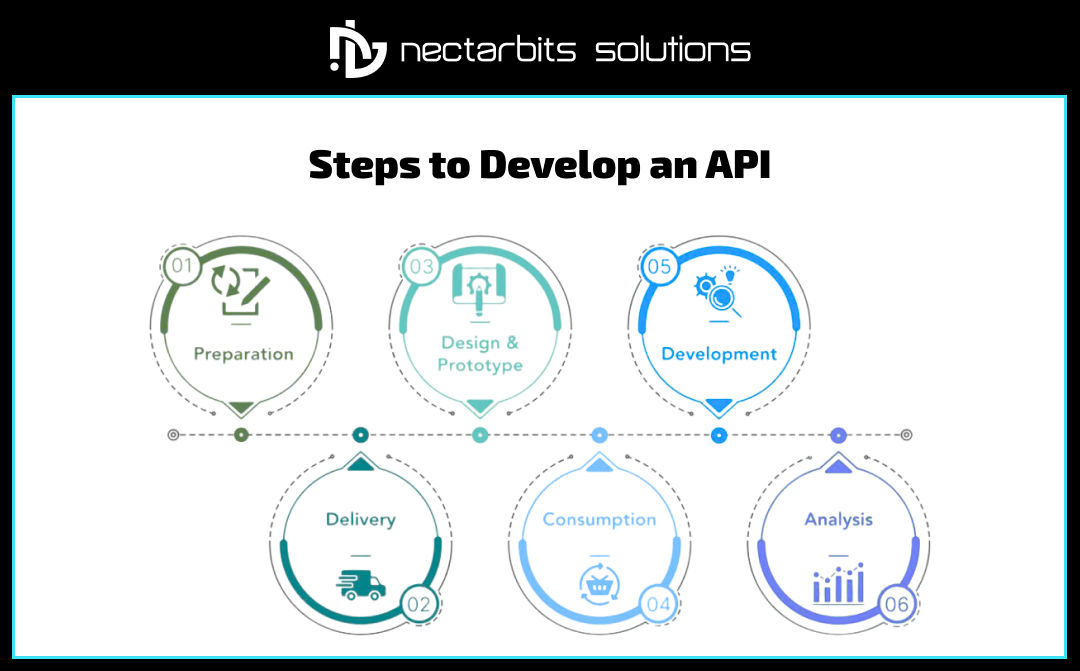
For businesses who are using APIs as a means to push data, the process seems daunting. Nevertheless, with a proper API Development Guide an easy and successful integration is guaranteed. Below are the steps of how to develop an API for your business:
1. Define Your Requirements
Before you start building an API, you should have a clearer understanding of how your business works to specify its particular requirements. What asynchronous principles would these systems apply? What packets must be sent to do this? If these elements are clearly defined upfront, it will act as the complete roadmap of the entire development process.
2. Select the Right API Development Platform
It’s important to choose the right API Development Platform. Different platforms offer different functionalities so you need to pick one that matches your requirements. Some platforms support SOAP or GraphQL, whereas others support REST APIs based on your business requirements.
3. Design Your API Architecture
The next step is to design the architecture when you have chosen a platform. You are to identify the endpoints into which the API will be accessed, the data structures, and what methods (Get, Post, Put, Delete, etc.) the API will support. The design of the API requires it to be scalable and easy to maintain.
4. Build and Test
After that, it’s time to build your API. During this part, developers will write the code to facilitate interaction between the API and the backend systems. After the API is built, it needs to go through thorough testing to make sure that it works as it should. Good API testing should be performed to verify the success in the performance part, security aspect, and usability attribute against the business needs.
5. Document Your API
Documentation is an important part of the API Development Guide . That is why you need to provide proper documentation to developers. The API will outline the endpoints, the format of the requests and responses, error codes, and if necessary, the authentication requirements.
6. Monitor and Maintain
Any API you deploy still needs monitoring and care taken of it after the API is published. It covers monitoring usage, recording some performance stats, and installing the patches smoothly in the future. Regular maintenance of your API makes sure it is still running at its maximum capability as your business expands.
How API Development Services Help Future-Proof Your Business
Essential in future-proofing businesses in an increasingly interconnected world, APIs are in high demand. API Development Services are an investment that businesses make, and it will help them deal with new technologies and also with market trends. Businesses can remain flexible through APIs so that features or even third-party services can be quickly integrated with an increasingly changing customer need.
APIs also give companies the flexibility to succeed in a fast-moving digital environment. With the rise of customer expectations, businesses need to adopt solutions such that they can respond faster. API Development is that framework.
Importance of APIs Based on Market Analytics and Trends
The API Development market has been growing rapidly in recent years, primarily due to the growing need for integration of seamless software and automation. Market research shows that the API economy will surpass $5.1 billion by 2027, as businesses across industries begin to adopt API-driven strategies. Here’s why APIs are becoming indispensable based on current market analytics and trends:
1. API-Driven Business Models
In fact, many leading companies, particularly in tech and eCommerce, have been building business models based entirely around APIs. In recent years third-party developers have used APIs pioneered by firms such as Google, Amazon, and PayPal to create innovative applications that further expand their ecosystems. These companies have become multi-billion dollar empires with this API Development Platform approach, but prove that the market is huge.
2. A Rapid Integration with the Third Party Services
As the world of businesses becomes more appliance-like, relying more on APIs to integrate third-party services allows businesses to give customers more features while not having to reinvent the wheel. Payment gateway, customer service, logistics, and analytics APIs help businesses scale quickly and cheaply without developing in-house the APIs to support them.
3. Increased API Monetization
Most organizations use APIs for integration, however, they have also become a source of revenue for many. The rise of APIs has seen companies in fintech, SaaS , and other data-heavy industries now seeing paid access to their APIs behind the APIs and becoming a thriving API marketplace. This potential to monetize API Development was a key growth strategy for many modern enterprises.
4. Digital Transformation on an accelerated timeline
With more and more organizations now prioritizing digital transformation, APIs are key to modernizing and connecting traditional systems with their cloud counterparts. The ability to modernize without having to retrofit the entire system permits businesses to accelerate the pace of innovation without going through a full-scale system overhaul. API Development Services supporting the integration of technologies like artificial intelligence, machine learning, and IoT enable organizations to seamlessly make use of them in their process.
Observing of these trends indicates that API Development is not only a technical undertaking but a strategic paramount for businesses hoping to become leaders in their industries. Rapid growth, higher scalability, and more robust customer experiences are all critical in today’s digital-first economy and APIs make this possible.
API Development Cost Analysis
If you are a business aiming to invest in the use of API Development, you must know the cost of the development of the API. Costs of developing an API vary and are dependent on the complexity of the project, but the following table gives a general overview of the factors that contribute to the cost of solving an API ranging from simple to complex functionalities.
| API Development Factors | Basic API | Intermediate API | Advanced API |
| Project Complexity | Simple data exchange | Multiple endpoints and data filtering | Real-time analytics, AI integration |
| Development Time (Hours) | 50-100 hours | 150-300 hours | 400+ hours |
| Developer Rates (per hour) | $50-$100 | $80-$150 | $120-$200 |
| Total Development Cost | $2,500 – $10,000 | $12,000 – $45,000 | $50,000 – $120,000 |
| Maintenance and Updates | Minimal ($1,000/year) | Moderate ($3,000/year) | High ($10,000+/year) |
| Security Features | Basic Authentication | OAuth2, Token-Based | Advanced Encryption, Multi-Factor Auth |
| Hosting Costs (per year) | $500 – $1,000 | $2,000 – $5,000 | $8,000 – $15,000 |
| Total Estimated Cost | $4,000 – $12,000 | $17,000 – $53,000 | $68,000 – $145,000 |
Key Factors Affecting API Development Costs:
- Project Complexity: The greater the API complexity (multiple systems or time-based data), the more expensive the development. If the APIs are simple, naturally the cost would be less for simple requests.
- Development Time: Developing an advanced API with real-time capabilities along with machine learning integration takes up quite some development hours, thereby increasing the cost to an extent.
- Security Features: API Development Services for businesses in sectors like finance or healthcare, offer strong security features (i.e. encryption and multi-factor authentication) which in turn considerably increases the cost.
- Ongoing Maintenance: In the case of API, it’s a continuous process to maintain the API by doing updates and bug fixes. This Maintenance will keep the API healthy, and secure, and allow it to scale with your growing business.
- Hosting and Infrastructure: APIs hosted in the cloud have a cost associated with them, which depends on how busy they are, how much they use them, and how complicated they are.
Read More:- How Much Does Car Wash App Development Costs in 2024?
Conclusion: Balancing Cost and Value Through API Development
Although the initial cost required for API development helps in getting your business off the ground, it is not about the initial cost, but rather the long-lasting value that it brings to your business. Being digitized these days, today’s API level of growth is a function of automation, scalability, and innovation, thus it’s a must-have for any company wishing to grow. Advanced APIs need a larger upfront investment but there are huge benefits in terms of operational efficiency, better customer experience, and generating new revenue streams and it’s all worth the cost.
Knowing the cost components and the importance of APIs in today’s burgeoning market, a business can accurately calculate how to implement APIs as a strategic part of operations and gain sustainable success and a survivability chance against market competitors.
Frequently Asked Questions (FAQs)
1. What is API Development and why is it important for businesses?
API Development refers to the process of creating application programming interfaces (APIs) that allow different software systems to communicate seamlessly. It’s critical for businesses today because it enables system integration, streamlining operations, and enhancing customer experiences.
- APIs eliminate manual processes by automating data exchange.
- They improve scalability, allowing businesses to grow with ease.
- APIs enhance customer experience by connecting different touchpoints.
2. How to develop an API for my business?
Developing an API requires several steps, starting with defining your business needs and selecting the appropriate API Development Platform. A structured API Development Guide can simplify this process.
- Define your API’s goals and required functions.
- Choose the right API platform (REST, SOAP, or GraphQL).
- Build, test, and document the API before final deployment.
3. What is API in Web Development?
APIs in web development enable different websites and applications to communicate and share data. This functionality is key to providing real-time, seamless experiences across platforms.
- APIs connect different systems and retrieve real-time data.
- Common examples include payment gateways, booking systems, and social media integration.
4. How do APIs improve operational efficiency?
APIs streamline business operations by automating processes that would otherwise require manual input. This not only reduces human error but also speeds up data exchange between systems.
- APIs automate tasks like syncing inventory or updating databases.
- They allow seamless integration with third-party services, boosting efficiency.
5. Why should businesses invest in API Development Services?
API Development Services future-proof your business by ensuring flexibility and adaptability in a rapidly changing digital landscape. They allow businesses to quickly integrate new services and features without major system overhauls.
- APIs provide scalability, accommodating growth and new technologies.
- They enhance security through controlled data access and compliance with regulations.

